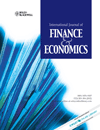
INTERNATIONAL JOURNAL OF FINANCE & ECONOMICS
Scope & Guideline
Bridging Theory and Practice in Finance
Introduction
Aims and Scopes
- Financial Markets and Instruments:
The journal explores various aspects of financial markets, including market efficiency, volatility dynamics, and the interplay between financial instruments such as stocks, bonds, and cryptocurrencies. - Economic Policy and Regulation:
Research often focuses on the effects of economic policies and regulatory frameworks on market behavior, financial stability, and institutional effectiveness, providing insights into policy implications. - Corporate Governance and Financial Performance:
The journal addresses the relationship between corporate governance structures and financial performance, examining how governance practices influence risk management and stakeholder engagement. - Sustainable Finance and ESG:
A significant focus is placed on sustainable finance, including environmental, social, and governance (ESG) considerations, and their impact on investment decisions and corporate behavior. - Emerging Markets and Development:
The journal provides a platform for research on emerging economies, investigating issues related to financial inclusion, macroeconomic stability, and the role of international trade. - Behavioral Finance and Investor Sentiment:
Studies often delve into behavioral finance, examining how investor sentiment and psychological factors influence market dynamics and decision-making processes. - Risk Management and Financial Stability:
The journal emphasizes research on risk management strategies, systemic risk, and the resilience of financial institutions in the face of economic shocks.
Trending and Emerging
- Cryptocurrency and Digital Finance:
There is a marked increase in studies related to cryptocurrencies, blockchain technology, and their impact on traditional financial markets, reflecting the growing interest in digital finance. - Climate Finance and Sustainability:
Research focusing on the intersection of finance and sustainability, particularly regarding climate transition risks and ESG performance, is gaining prominence as global awareness of environmental issues rises. - Impact of Economic Policy Uncertainty:
An emerging theme involves the analysis of how economic policy uncertainty affects financial markets and investment decisions, particularly in the context of recent global crises. - Behavioral Economics and Investor Behavior:
There is a growing interest in understanding the behavioral aspects of finance, including how emotions and cognitive biases influence investor decisions and market outcomes. - Machine Learning and AI in Finance:
The application of machine learning and artificial intelligence techniques in financial modeling and risk assessment is becoming increasingly prevalent, showcasing innovation in quantitative finance. - Cross-Border Economic Analysis:
Research examining the implications of cross-border investments and global economic interdependencies is on the rise, reflecting the interconnected nature of modern economies.
Declining or Waning
- Traditional Banking Models:
Research focused on traditional banking systems and their operations may be waning, as the rise of fintech and alternative financial services reshapes the landscape. - Static Economic Models:
The reliance on static economic models without considering dynamic interactions and real-time data analysis appears to be less prevalent, as researchers seek more adaptable frameworks. - Local Market Analyses:
There seems to be a decline in studies exclusively focused on local market conditions without broader international comparisons, reflecting a trend towards more globalized perspectives. - Conventional Investment Strategies:
As interest in sustainable and socially responsible investing grows, traditional investment strategies lacking ESG considerations may be receiving less attention. - Historical Economic Analysis:
Research centered solely on historical economic events without linking them to contemporary issues may be diminishing, as the focus shifts to forward-looking analyses and predictive models.
Similar Journals
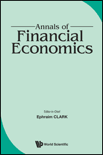
Annals of Financial Economics
Illuminating Contemporary Issues in Financial EconomicsAnnals of Financial Economics, published by World Scientific Publishing Co. Pte Ltd, is a premier scholarly journal catering to the fields of finance, economics, and international management. With an impressive impact factor and categorized in the Q2 quartile across multiple disciplines in the 2023 rankings, the journal holds a prominent position among its peers, evidenced by its ranking in the top 15% for Economics and Econometrics and Finance categories. The journal aims to foster high-quality, innovative research that addresses contemporary financial issues, making it a vital resource for researchers, professionals, and students alike. Although it does not operate under an open access model, it ensures that its contributions advance scientific discourse and provide valuable insights into financial theories, practices, and policies. With a historical publication span from 2005 to 2009 and again from 2011 to 2024, the Annals remains a critical platform for disseminating transformative ideas in financial economics, ensuring its relevance in a rapidly evolving scholarly landscape.
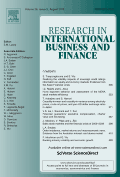
Research in International Business and Finance
Empowering research that shapes international markets.Research in International Business and Finance is a premier academic journal published by ELSEVIER, dedicated to advancing the field of international business and finance through high-quality research dissemination. With its ISSN 0275-5319 and E-ISSN 1878-3384, this journal stands out in the international research community, boasting an impressive Q1 ranking in both the Business, Management and Accounting and Finance categories for 2023. The journal aims to stimulate insightful discussions and provide a platform for innovative theories and practices from global perspectives, emphasizing empirical research and critical analysis. As it converges towards 2025, it continues to hold a prominent position in its fields, currently ranking #8 out of 189 in Business and #18 out of 317 in Finance according to Scopus. Although it does not offer open access options, the journal’s rigorous peer-review process ensures that only the most impactful research is published, making it an essential resource for researchers, professionals, and students striving for excellence in international business and finance.
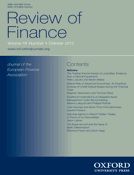
Review of Finance
Cultivating excellence in finance, accounting, and economic scholarship.The Review of Finance, published by Oxford University Press, stands as a premier academic journal in the fields of Finance, Accounting, and Economics. With an ISSN of 1572-3097 and an impressive track record stretching from 2001 to 2024, this journal is consistently recognized for its high-quality research, reflected in its Q1 rankings across key categories, including Accounting, Finance, and Economics and Econometrics. The Review of Finance is dedicated to advancing the understanding of financial phenomena through robust empirical and theoretical insights, making it an essential resource for researchers and professionals alike. Additionally, its strong Scopus rankings, placing it in the top percentiles, highlight its influence and relevance in ongoing academic discourse. Although the journal is not open access, it remains widely accessible through academic institutions, ensuring that its valuable contributions reach an extensive audience. The editorial board invites submissions that promise to further engage the academic community in the dynamic intersections of finance, accounting, and economic research.
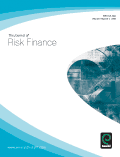
Journal of Risk Finance
Exploring contemporary challenges in risk finance.The Journal of Risk Finance, published by Emerald Group Publishing Ltd, is a premier academic journal dedicated to advancing the understanding of risk management and finance practices since its inception in 1999. With a strong foothold within the Q2 rankings in both Accounting and Finance categories, it proudly holds a significant place in the scholarly landscape, ranking #54 out of 317 in the Scopus Economics and Finance category, placing it in the 83rd percentile. The journal aims to facilitate the exchange of innovative research and practical insights, catering to an audience of researchers, professionals, and students eager to explore contemporary issues in risk finance. While not an open access journal, it provides numerous access options, ensuring that essential findings reach a broad readership. Set in the United Kingdom and covering publications up to 2024, the Journal of Risk Finance continues to be an indispensable resource for those committed to this critical field.

Asia-Pacific Financial Markets
Elevating Financial Scholarship Across the Asia-PacificAsia-Pacific Financial Markets is a distinguished academic journal published by SPRINGER, dedicated to advancing the field of finance research in the Asia-Pacific region. With an ISSN of 1387-2834 and an E-ISSN of 1573-6946, this journal fosters scholarly discourse on contemporary financial markets, investment strategies, and economic policy implications. Situated within the Q3 category in Finance for 2023, it ranks #140 out of 317 in the Scopus database, reflecting its growing significance and impact within the financial research community, as evidenced by its 55th percentile ranking. Since its inception in 1996, the journal has served as a pivotal platform for researchers, professionals, and students alike, featuring rigorous empirical studies and theoretical frameworks that address emerging financial trends and challenges. While it operates under a subscription model, the journal's comprehensive scope and commitment to high academic standards make it an essential resource for anyone looking to deepen their understanding of finance in the dynamic Asia-Pacific landscape.
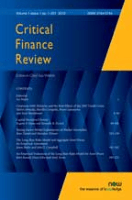
Critical Finance Review
Unveiling the intricacies of financial systems with scholarly precision.Critical Finance Review is a premier academic journal dedicated to advancing the field of finance through the publication of high-quality research that spans various dimensions of the discipline. Published by NOW PUBLISHERS INC, this journal has quickly established itself as a leading source of innovative finance scholarship, achieving a notable Q1 classification in the 2023 finance category. Operating under a rigorous peer-review process, the journal ensures the academic integrity and relevance of its content, which attracts contributions from both emerging and established scholars. With an ISSN of 2164-5744 and E-ISSN 2164-5760, it is accessible to a global audience, though it operates under traditional access models. The journal welcomes a diverse range of topics including, but not limited to, risk management, financial markets, and quantitative finance, making it an essential resource for researchers, professionals, and students who are keen to explore the complexities of financial systems and develop new insights in the ever-evolving landscape of finance. Based in the United States, Critical Finance Review holds a significant position within the academic community, fostering a collaborative environment that encourages innovative thinking and practical applications of financial theories.
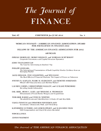
JOURNAL OF FINANCE
Shaping the future of finance through impactful research.JOURNAL OF FINANCE, published by Wiley, stands as a premier academic journal in the fields of finance, economics, and accounting. With a history dating back to 1946, the journal has consistently delivered impactful research that shapes financial theory and practice, boasting an impressive impact factor reflective of its high citation rate. Its Quartile 1 ranking in Accounting, Economics and Econometrics, and Finance illustrates its leading position within these disciplines. Although not an open access publication, the journal continues to be indispensable for researchers, professionals, and students seeking to advance their understanding and knowledge through rigorous empirical analysis and comprehensive reviews. With an esteemed global readership, the JOURNAL OF FINANCE remains committed to fostering the dissemination of innovative financial research well into 2024 and beyond.
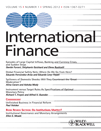
International Finance
Advancing global financial insights.International Finance is a prestigious academic journal published by WILEY, dedicated to the exploration and advancement of theories and practices in the realms of finance, development, and geography. With a strong emphasis on empirical and theoretical research, this journal provides a crucial platform for researchers, professionals, and students to disseminate cutting-edge findings that shape our understanding of the financial landscape on a global scale. Holding an impressive impact factor and categorized in the Q2 quartile across multiple disciplines, including Development, Finance, and Geography, the journal has established itself as a significant contributor to scholarly discourse. Since its inception in 1998 and spanning until 2024, International Finance offers a comprehensive overview of current trends and challenges faced in financial contexts, enhancing the decision-making processes within academia and industry alike. Although the journal is not open access, its rigorous peer-review process guarantees high-quality content that is indispensable for anyone engaged in the diverse fields intersecting with finance.

International Review of Finance
Innovating discourse in the realm of finance research.International Review of Finance is a prestigious academic journal published by Wiley, located in the United Kingdom. With its ISSN 1369-412X and E-ISSN 1468-2443, this journal serves as an essential platform for researchers and practitioners in the fields of Economics and Finance. Ranked in the Q2 quartile for both Economics and Econometrics and Finance as of 2023, it showcases high-quality research that contributes significantly to theoretical and practical advancements. Reflecting its standing, the journal is positioned in the 61st percentile in Economics and Econometrics and the 60th percentile in Finance according to Scopus rankings. The scope of the journal includes a diverse range of topics, encouraging innovative discourse across various financial disciplines. Although it does not offer open access, the International Review of Finance continues to be an important resource for academics, professionals, and students seeking to deepen their understanding of evolving financial theories and practices.
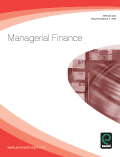
MANAGERIAL FINANCE
Innovating Insights for Financial Leaders.MANAGERIAL FINANCE is a prestigious academic journal published by Emerald Group Publishing Ltd, focused on the areas of finance, management, and strategy. With an ISSN of 0307-4358 and an E-ISSN of 1758-7743, this journal has carved a niche for itself within the business and financial sectors, achieving a commendable Q2 category ranking across multiple domains, including Business, Management and Accounting, Finance, and Strategy and Management, as of 2023. The journal aims to provide a platform for insightful research and critical analysis while fostering an understanding of contemporary financial practices and theories. With its wide-ranging scope, it serves as a vital resource for researchers, professionals, and students alike, looking to stay abreast of the latest trends and challenges in managerial finance. The editorial board is committed to maintaining academic rigor, ensuring that articles published are of the highest quality and relevance to the field. By bridging the gap between theory and practice, MANAGERIAL FINANCE is an essential reference for anyone involved in financial decision-making and strategic management.